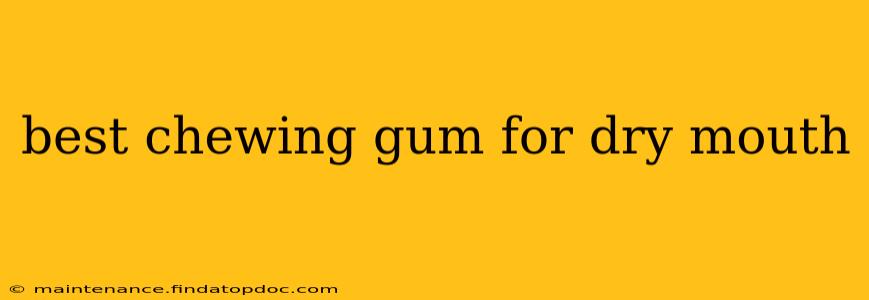Dry mouth, or xerostomia, is a common condition affecting millions. It can lead to discomfort, difficulty speaking, and an increased risk of cavities. While many factors contribute to dry mouth, finding the right chewing gum can offer significant relief. But not all chewing gums are created equal. This guide explores the best options and what to look for when choosing a gum to combat dry mouth.
What Makes Chewing Gum Good for Dry Mouth?
The key is stimulating saliva production. Chewing gum mechanically stimulates the salivary glands, encouraging them to produce more saliva, thereby lubricating the mouth and relieving dryness. However, the type of gum matters significantly. Sugar-free options are crucial to avoid exacerbating the problem. Sugar feeds bacteria, contributing to dental issues already more prevalent with dry mouth.
What to Look for in Chewing Gum for Dry Mouth
- Sugar-Free: This is non-negotiable. Look for gums specifically labeled "sugar-free." Artificial sweeteners like xylitol are often used and have added benefits, such as inhibiting bacterial growth.
- Xylitol: As mentioned, xylitol is a natural sweetener with added benefits for oral health. It's known to reduce plaque and prevent cavities, making it a great choice for those prone to dry mouth.
- Sorbitol: Another sugar alcohol, sorbitol, is frequently used in sugar-free gums. While generally safe, it can cause digestive issues in some individuals if consumed in large quantities.
- Ingredients: Check the ingredient list for potential irritants. Some artificial flavors or colors may worsen dry mouth symptoms in sensitive individuals.
- Flavor: Choose a flavor you enjoy! The more you enjoy the gum, the more likely you are to chew it regularly, maximizing the saliva-stimulating benefits.
What are the best brands of chewing gum for dry mouth?
Many brands offer sugar-free options with xylitol. However, it's crucial to read the labels carefully. Look for gums prominently featuring "sugar-free" and ideally, "xylitol" on the packaging.
Does chewing gum with xylitol really help with dry mouth?
Yes, chewing gum containing xylitol has been shown to be effective in stimulating saliva production. Furthermore, the antibacterial properties of xylitol contribute to better oral health, which is particularly important for those with dry mouth who are at increased risk of cavities.
Are there any downsides to chewing gum for dry mouth?
While generally beneficial, excessive chewing can lead to jaw pain or discomfort. Additionally, some individuals may experience digestive upset from certain sugar alcohols like sorbitol. Moderation is key.
Can chewing gum replace other treatments for dry mouth?
No. Chewing gum is a supplemental treatment, not a replacement for addressing the underlying cause of dry mouth. If you experience persistent dry mouth, consult a dentist or doctor to determine the underlying cause and explore appropriate treatment options. This could involve addressing medications that cause dry mouth, managing underlying medical conditions, or using saliva substitutes.
What if I have sensitive teeth?
If you have sensitive teeth, opt for gums that are explicitly formulated for sensitive teeth. These may contain less abrasive ingredients and are less likely to aggravate sensitive areas.
How often should I chew gum for dry mouth?
There isn't a single magic number. Listen to your body. Chew as needed to alleviate dryness but avoid excessive chewing, which can cause jaw fatigue. Consider chewing for short periods throughout the day rather than one long session.
Conclusion
Choosing the right chewing gum can be a valuable tool in managing dry mouth symptoms. By selecting sugar-free options, ideally containing xylitol, and paying attention to ingredients, you can find a gum that effectively stimulates saliva production while promoting overall oral health. However, remember that chewing gum is a supplementary measure, and addressing the underlying cause of dry mouth remains crucial for long-term relief.
